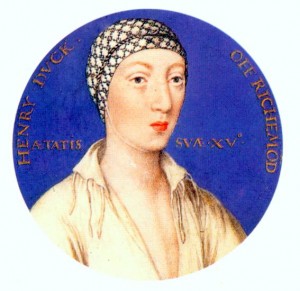 This date in history, 15th June 1519, is the date traditionally given for the birth of Henry VIII’s recognised illegitimate son, Henry Fitzroy, Duke of Richmond and Somerset.
This date in history, 15th June 1519, is the date traditionally given for the birth of Henry VIII’s recognised illegitimate son, Henry Fitzroy, Duke of Richmond and Somerset.
Fitzroy was born at the Priory of St Lawrence, in Blackmore, Essex. His mother, Elizabeth (Bessie) Blount, had been sent away from court to the prior’s house at Blackmore by Cardinal Thomas Wolsey before her pregnancy became visible. Bessie had been noticed by Henry VIII when she was serving his wife, Queen Catherine of Aragon, as a maid of honour.
Also on this day in history, 15th June 1536, Henry VIII sent members of his council, led by Thomas Howard, 3rd Duke of Norfolk, to visit his daughter, the Lady Mary, and bully her into accepting her father as supreme head of the Church in England, and acknowledging that she was not the legitimate heir to the throne.